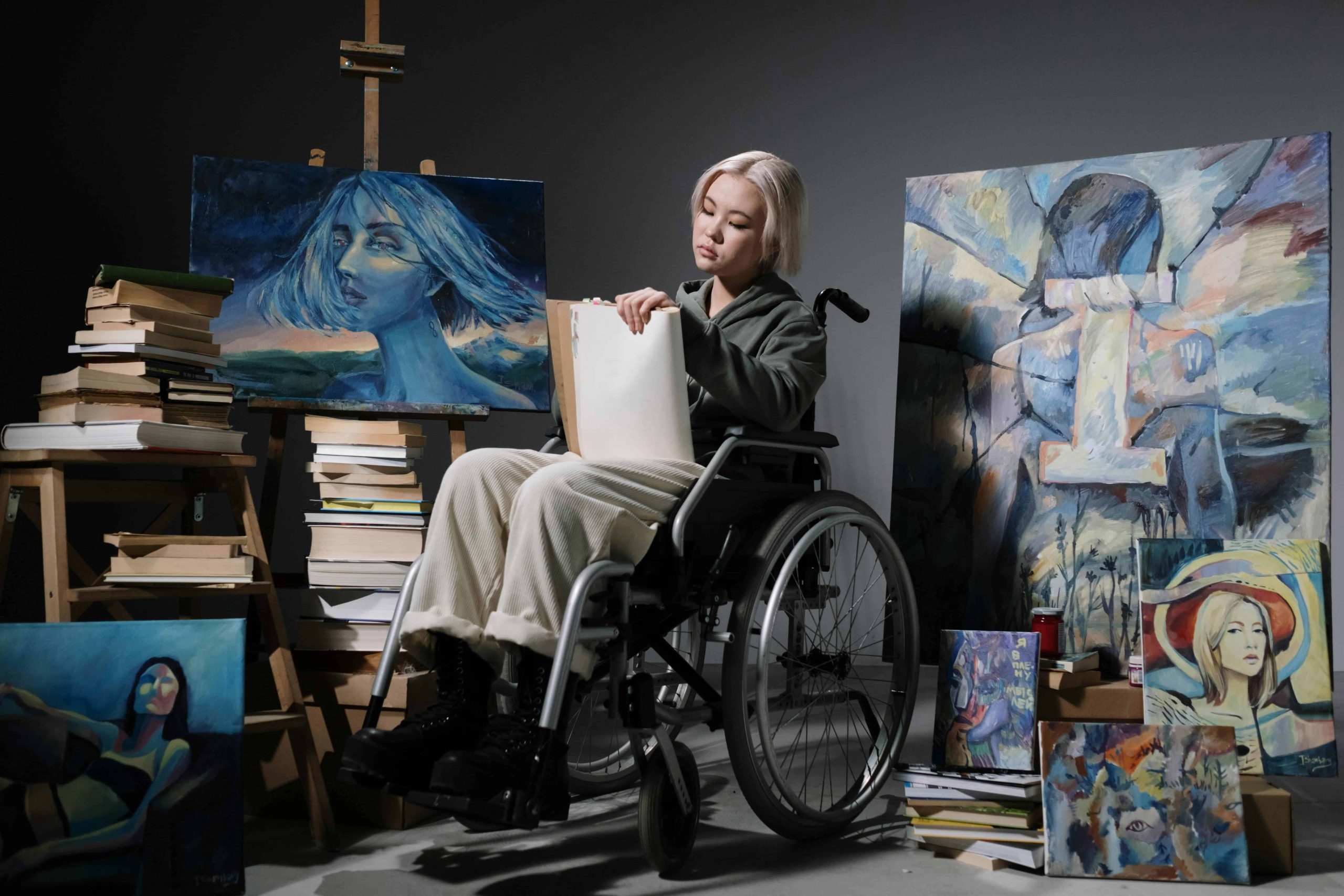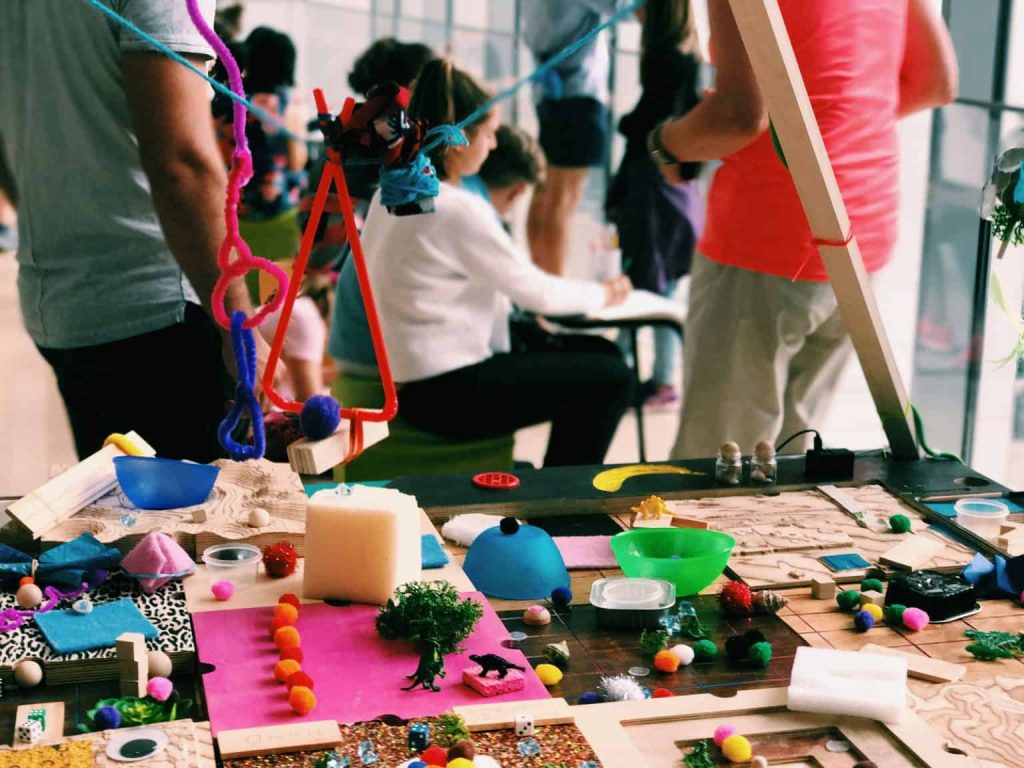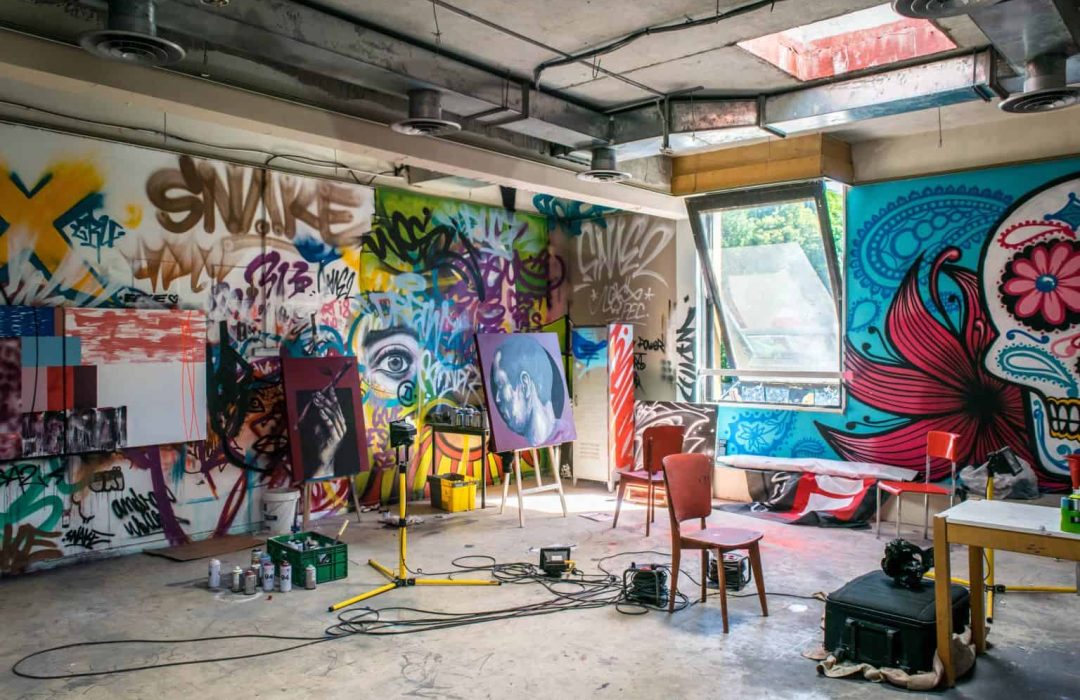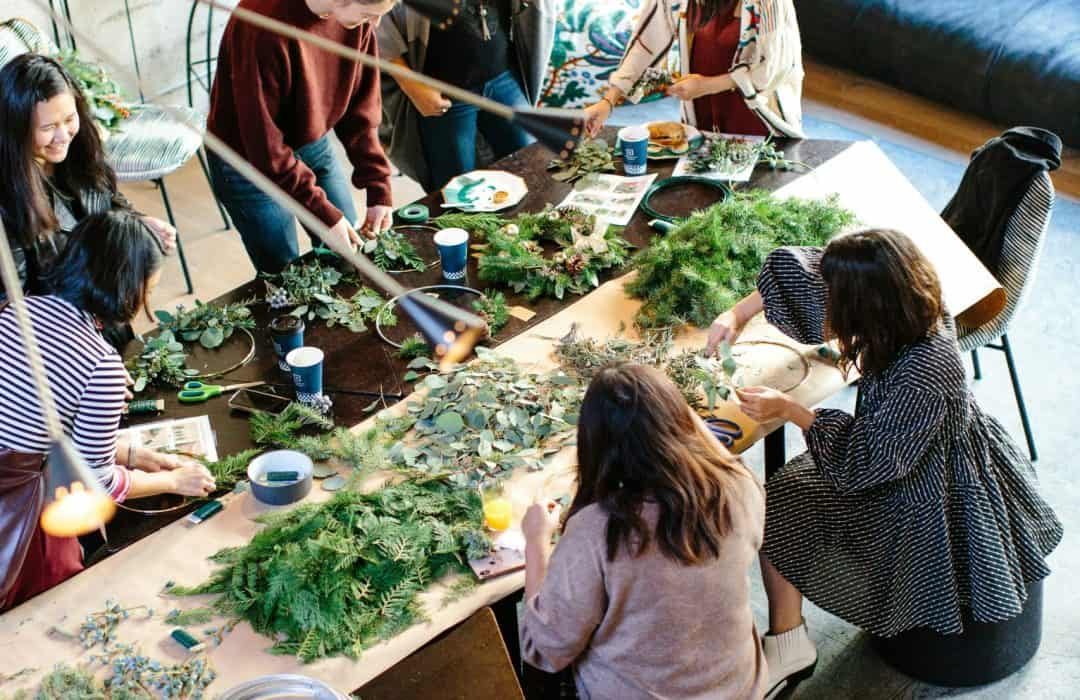
16 Feb Art Workshops as a Community Engagement Tool
Art workshops have surged in popularity as an ever-growing number of individuals actively seek channels for fostering creative expression and meaningful community engagement. In a world characterized by rapid technological advancements and a fast-paced lifestyle, the allure of these workshops lies in their ability to provide a sanctuary where participants can explore their artistic inclinations while simultaneously connecting with like-minded individuals. Beyond serving as mere spaces for artistic endeavors, these workshops have evolved into dynamic arenas for collaboration and open dialogue. As people yearn for genuine connections and avenues to express their authentic selves, art workshops stand out as havens where individuals can not only refine their artistic skills but also cultivate a sense of community, fostering a shared passion for creativity and self-discovery.
The Power of Art Workshops for Community Engagement

Photo by Emily Webster
Building Connections and Fostering Collaboration
Art workshops serve as transformative spaces, where participants embark on a journey of shared experiences, transcending barriers that often fragment community interactions. Through the lens of collaborative projects, individuals discover the essence of teamwork, realizing that collective efforts yield profound results. As they engage in artistic endeavors together, participants naturally cultivate open communication and dialogue, laying the foundation for enduring connections. The bonds forged during these workshops extend far beyond the confines of the studio, intricately weaving a tapestry of collaboration that enriches the entire community.
Cultivating a Sense of Belonging and Shared Identity
Within the dynamic realm of art workshops, individuals find a sanctuary to share their narratives and perspectives, fostering an environment where personal stories intertwine to form a collective narrative of belonging. Embracing diversity becomes not merely an aspiration but a lived reality as participants collaborate in the creation of art that celebrates their unique identities. In this inclusive space, every voice resonates, every perspective contributes to the vibrant mosaic of shared identity. Through the act of co-creation, participants not only find belonging but also take ownership of the community’s cultural heritage, nurturing a sense of pride that transcends individual experiences.
Empowering Individuals and Communities
Art workshops serve as incubators of empowerment, where individuals transcend the boundaries of paint and canvas to discover the depths of their creativity and potential. As participants engage in artistic exploration, they embark on a journey of self-discovery, gaining confidence in their abilities to effect change. Through the lens of art, individuals confront social issues, channeling their creativity into advocacy and action. These workshops become crucibles of transformation, empowering communities to amplify their voices, address systemic challenges, and envision a future imbued with hope and possibility. In the hands of empowered individuals, art becomes a catalyst for positive change, illuminating pathways toward a more inclusive and equitable society.
Successful Art Workshops in Community Engagement

Photo by Matthieu Comoy
Mural Painting for Neighborhood Revitalization
In a neglected neighborhood characterized by urban decay and disconnection, an art workshop centered around mural painting emerged as a beacon of hope and transformation. Through collective effort and creative collaboration, residents joined forces to adorn the neighborhood’s walls with vibrant colors and meaningful imagery. As brushstrokes merged and ideas intertwined, a palpable sense of community pride began to take root. The once-forgotten streets now bore the imprint of shared vision and renewed vitality, serving as a testament to the power of art in revitalizing neglected spaces. Beyond mere aesthetics, the mural became a symbol of collective ownership and resilience, inspiring residents to reclaim their neighborhood and forge stronger bonds with one another.
Theater Workshop Addressing Environmental Concerns
In a local community grappling with pressing environmental issues, a theater workshop emerged as a powerful vehicle for advocacy and awareness. Through the transformative medium of storytelling and performance, participants embarked on a journey to illuminate the ecological challenges facing their surroundings. Through poignant narratives and compelling enactments, they brought to life the urgency of environmental conservation and the need for sustainable practices. As audiences were moved and inspired by the theatrical presentations, a collective commitment to environmental stewardship began to take shape. The workshop not only heightened awareness but also catalyzed tangible action, fostering a community-wide resolve to protect and preserve the natural world for future generations.
Intergenerational Understanding Through Mixed-Media Art
In a community characterized by diverse generational perspectives and cultural traditions, a mixed-media art workshop emerged as a bridge across the divides of age and experience. Through the shared language of creativity, participants from different generations came together to explore and celebrate their unique heritage. As elders shared stories of the past and young artists infused modern flair into traditional techniques, a rich tapestry of intergenerational exchange unfolded. The workshop became a melting pot of ideas and traditions, enriching the community’s cultural fabric and fostering a deeper sense of understanding and connection across generations. In the collaborative spirit of art-making, barriers dissolved, and bonds of empathy and respect were forged, paving the way for a more cohesive and inclusive community tapestry.
Strategies for Effective Art Workshops in Community Engagement

Photo by Hillary Ungson
Identifying Community Needs
Tailoring workshops to address specific community needs ensures relevance and resonance. By delving into the unique challenges and aspirations of the community, workshop organizers can effectively shape their content and activities. Whether it’s addressing educational gaps, economic disparities, or social issues, understanding the pulse of the community lays the foundation for impactful engagement. Through surveys, interviews, and community forums, organizers can gather invaluable insights to inform their workshop designs, ensuring they directly address the concerns and priorities of those they aim to serve.
Ensuring Accessibility and Inclusivity
Creating workshops that cater to participants of all ages and backgrounds fosters a truly inclusive environment. Recognizing the diverse needs and perspectives within a community is essential for promoting equal access and participation. Organizers must consider factors such as language proficiency, physical accessibility, and cultural sensitivities to ensure that workshops are accessible to everyone. Implementing flexible scheduling, providing language interpretation services, and offering alternative formats for participation can help remove barriers and make workshops welcoming to individuals from various walks of life. By embracing inclusivity, workshops become spaces where diverse voices can be heard, valued, and respected, enriching the overall experience for everyone involved.
Creating a Supportive Workshop Environment
A supportive and engaging workshop environment encourages participants to express themselves freely. Facilitators play a crucial role in cultivating a sense of safety and trust within the workshop setting. By fostering open communication, actively listening to participants’ ideas and concerns, and promoting a non-judgmental atmosphere, facilitators create spaces where individuals feel empowered to share their perspectives and explore their creativity. Incorporating team-building activities, icebreakers, and reflective exercises can further strengthen bonds among participants and enhance collaboration. By nurturing a supportive workshop environment, facilitators inspire creativity, encourage peer learning, and foster a sense of belonging among participants, ultimately enhancing the overall workshop experience.
Evaluating Impact and Success
Regularly evaluating the impact of workshops is crucial for ongoing improvement. Monitoring metrics such as community participation, project sustainability, and individual growth provides valuable insights into the effectiveness of community engagement efforts. Surveys, feedback forms, and focus groups can help gather qualitative data on participants’ experiences, satisfaction levels, and perceived outcomes. Additionally, tracking quantitative indicators such as attendance rates, project outcomes, and community partnerships offers objective measures of success and helps identify areas for refinement. By soliciting input from stakeholders and analyzing both qualitative and quantitative data, organizers can assess the overall impact of workshops, identify strengths and areas for improvement, and make informed decisions to enhance future programming. Continuous evaluation ensures that workshops remain responsive to evolving community needs and aspirations, maximizing their long-term effectiveness and relevance.

Photo by Marvin Meyer
Conclusion
Art workshops serve as dynamic platforms for community engagement, fostering connections, empowerment, and positive change. Through collaborative projects and shared artistic expression, these workshops build bridges within communities, nurturing a sense of belonging and shared identity. By empowering individuals with creative skills and amplifying their voices, art workshops become catalysts for advocacy and social transformation. The success of art workshops in community engagement hinges on several key strategies, including identifying community needs, ensuring accessibility and inclusivity, creating supportive workshop environments, and evaluating impact. By tailoring workshops to address specific challenges and aspirations, removing barriers to participation, and nurturing a culture of creativity and collaboration, communities can maximize the potential of art as a tool for meaningful engagement.
As demonstrated by successful initiatives such as mural painting for neighborhood revitalization, theater workshops addressing environmental concerns, and intergenerational art exchanges, art workshops have the power to inspire change and unite communities across diverse backgrounds and generations. In essence, the value of art workshops as a community engagement tool lies not only in the creation of beautiful works of art but also in the cultivation of connections, empowerment of individuals, and transformation of communities. By embracing the transformative potential of art, communities can embark on a journey of creativity, connection, and collective empowerment.
Key Takeaways
Key Points | Implications |
Art workshops foster collaboration and dialogue, breaking down barriers in communities. | Collaboration leads to shared visions, strengthening community bonds. |
Inclusivity in art workshops celebrates diversity, cultivating a sense of belonging. | Inclusive environments empower individuals and promote community pride. |
Artistic exploration empowers individuals and communities to address social issues. | Creative expression becomes a catalyst for advocacy and positive change. |
FAQs
Can anyone participate in art workshops?
Art workshops are indeed structured to be accessible to anyone interested, irrespective of their age, background, or skill level. These workshops are crafted with inclusivity in mind, aiming to create environments where individuals feel welcomed and encouraged to explore their creativity freely. The overarching goal is to foster a sense of community and connection through the shared experience of art-making, making it accessible to all who wish to participate.
How can art workshops address social issues?
Addressing social issues through art workshops involves providing individuals with a platform to express themselves creatively on pertinent topics. These workshops serve as catalysts for dialogue, allowing participants to engage in meaningful discussions and advocate for social change through their artistic expressions. By encouraging self-expression and fostering empathy, art workshops can shed light on various social issues and inspire collective action towards positive transformation.
What resources are available for organizing art workshops in communities?
Organizing art workshops in communities often requires tapping into a range of resources to ensure their success. From online platforms that offer instructional materials and guidance to local community centers and art organizations that provide space and support, there are numerous avenues available for organizers to leverage. Collaborations with artists, educators, and community leaders can also enrich the workshop experience and extend its reach within the community.
How do you measure the success of an art workshop?
Measuring the success of an art workshop entails evaluating its impact on multiple levels. Community participation serves as a key indicator of engagement and interest, reflecting the workshop’s ability to resonate with its intended audience. Additionally, assessing the sustained impact of workshop projects on individuals and communities provides valuable insights into their effectiveness. Observing individual growth and development over time, both in artistic skills and social awareness, further underscores the workshop’s significance. Regular evaluations help organizers gauge the workshop’s effectiveness and make informed decisions for future iterations, ensuring continued relevance and impact.
Use smart “Marketing Strategies for Virtual Art Exhibitions” to boost your virtual art tours. You can do this by utilizing influencer partnerships, social media campaigns, targeted email newsletters, and interesting content creation to expand your audience, create buzz, and encourage deep engagement with people all over the world.

